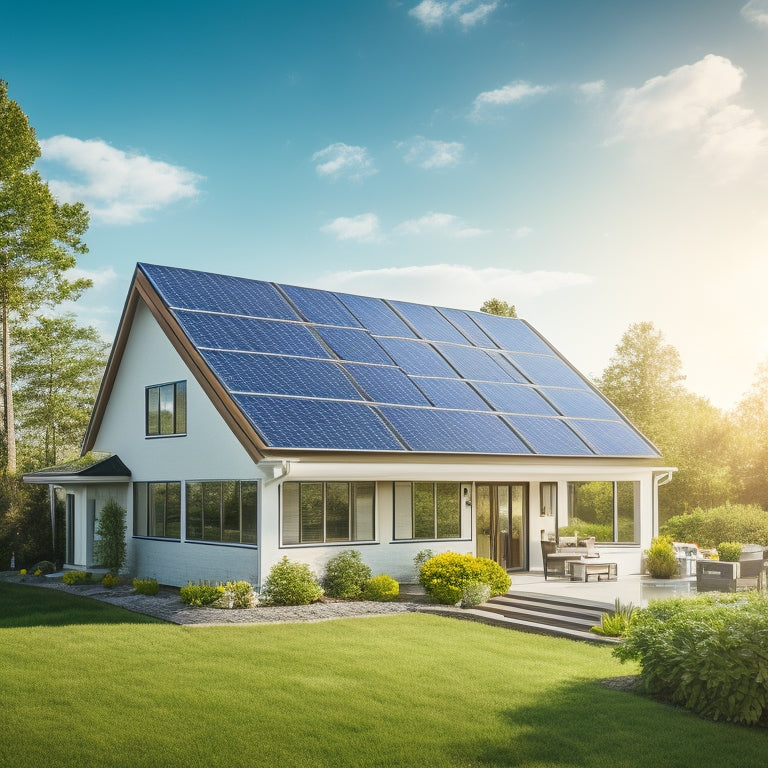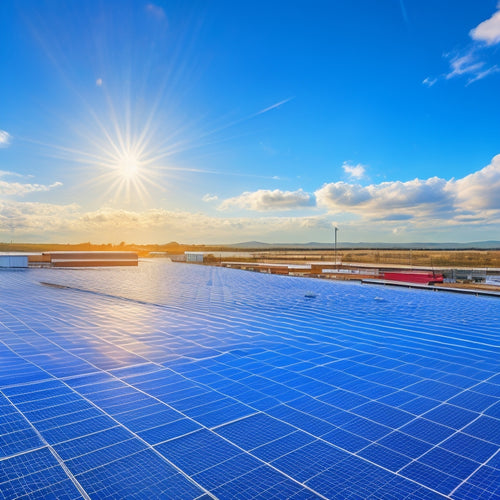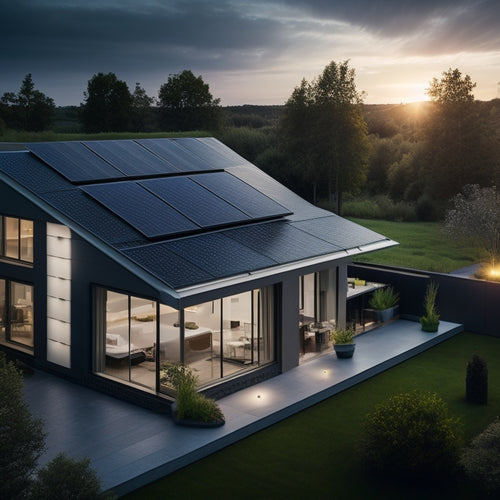
Solar Panel Kits for Homes: 10 Essential Tips
Share
As you prepare to invest in a solar panel kit for your home, prioritize getting it right. Choose a high-efficiency panel, assess your energy needs, and understand system components like mounting options and inverter selection. Select a suitable battery type, guarantee proper installation, and budget accordingly. Evaluate online retailers, consider warranties and support services, and prioritize monitoring and maintenance. By following these essential tips, you'll be well on your way to harnessing the benefits of solar energy. And, as you continue to explore the world of solar panel kits, you'll uncover even more valuable insights to maximize your investment.
Key Takeaways
• Assess your energy needs by conducting an energy audit, reviewing historical consumption, and calculating energy requirements.
• Choose a solar panel with high efficiency (20% or higher), considering factors like wattage, voltage, and compatibility.
• Select a suitable battery type based on capacity, usage during low sunlight, and deep cycle capabilities, and consider pros and cons of each type.
• Ensure proper installation and placement by hiring professionals, optimizing placement, and ensuring proper wiring and maintenance.
• Research and compare brands, warranties, and customer reviews to find the best solar panel kit for your home, considering factors like durability and lifespan.
Choosing the Right Solar Panel
When selecting a solar panel for your home, consider the wattage, voltage, and compatibility with your existing electrical system to guarantee maximum energy production. You'll want to choose a panel that can efficiently convert sunlight into electricity.
Panel efficiency is an essential factor, as it determines how much power you can generate per hour of sunlight. Look for high-efficiency panels with a rating of 20% or higher.
To make an informed decision, research and compare different brands. Brands like Tesla, Panasonic, and SunPower offer high-quality panels with impressive efficiency ratings. Compare their specifications, warranty periods, and customer reviews to find the best fit for your needs.
A thorough brand comparison will help you identify the most reliable and efficient panels for your home. Additionally, consider the durability and lifespan of the panels, as well as the manufacturer's reputation for producing high-quality products.
Assessing Your Energy Needs
You'll need to determine your home's energy requirements to make sure your solar panel kit is properly sized to meet your electricity needs. This step is important in ensuring your solar panel system provides the power you need to run your appliances and lighting.
To assess your energy needs, consider the following factors:
-
Conduct an energy audit: Hire a professional to assess your home's energy efficiency and identify areas of improvement.
-
Review historical consumption: Analyze your past electricity bills to determine your average daily energy usage.
-
Account for future changes: Consider any upcoming changes to your energy usage, such as adding new appliances or family members.
-
Calculate your energy requirements: Use online tools or consult with a professional to determine the total wattage required to meet your energy needs.
-
Consider your energy goals: Determine how much of your energy usage you want to offset with solar power.
Understanding System Components
When exploring solar panel kits for your home, it's crucial to grasp the components that comprise a solar panel system.
You'll need to evaluate the type of solar panels that best suit your needs, ensuring you have the right system size to meet your energy requirements.
Solar Panel Types
Your solar panel system's efficiency largely depends on the type of solar panels you choose, with each type offering distinct benefits and drawbacks. As you explore your options, consider the following key types of solar panels:
-
Monocrystalline panels: Known for their high efficiency rates and sleek appearance, these panels are a popular choice. Monocrystalline advantages include higher power output and better performance in low-light conditions.
-
Polycrystalline panels: A more affordable option, these panels offer slightly lower efficiency rates but still provide reliable performance.
-
Bifacial panels: These innovative panels harness energy from both the front and back sides, increasing energy output by up to 25%. Bifacial benefits include improved performance in certain environments and increased energy yield.
-
Thin-film panels: A cost-effective option, these panels are lightweight and flexible, making them ideal for specific installations.
-
Perovskite panels: The newest player in the market, these panels boast higher power conversion efficiency and potentially lower production costs.
When selecting the right solar panel type for your home, weigh the pros and cons of each option carefully to make sure you're getting the most out of your solar panel system.
System Sizing Importance
Accurate system sizing is crucial to guaranteeing that your solar panel kit operates at peak efficiency and meets your energy needs. A well-sized system ensures you generate enough electricity to power your home, reducing your reliance on the grid and maximizing your energy savings. To get it right, you'll need to conduct a thorough load calculation, taking into account your energy usage patterns, roof size, and local building codes.
Here's a breakdown of the key considerations for system sizing:
| Factor | Description |
|---|---|
| Energy Efficiency | Make sure your system is optimized for energy efficiency to minimize energy losses and maximize output. |
| Load Calculation | Calculate your energy needs based on your appliance usage, lighting, and HVAC systems. |
| Roof Size and Orientation | Consider the size and orientation of your roof to determine the ideal system size and layout. |
Mounting Options Considered
With your solar panel kit's system size determined, you're prepared to explore the mounting options that will secure your panels to your roof. This important step ensures your solar panels remain in place, even in harsh weather conditions.
When selecting a mounting system, consider the following essential factors:
-
Roof type and material: Make sure the mounting system is compatible with your roof's material, whether it's asphalt shingles, metal, or tile.
-
Roof penetration: Opt for a system that minimizes roof penetration, reducing the risk of leaks and water damage.
-
Flashing integration: Choose a mounting system that seamlessly integrates with your roof's flashing, ensuring a watertight seal.
-
Adjustability and flexibility: Select a system that allows for adjustments to accommodate varying roof angles and pitches.
-
Durability and corrosion resistance: Look for mounting systems made from high-quality, corrosion-resistant materials that can withstand harsh environmental conditions.
Selecting the Best Battery Type
When selecting a battery for your solar panel kit, you'll want to take into account the capacity that's right for your needs.
You'll need to determine how much energy you'll require during periods of low sunlight or at night, and choose a battery that can store enough power to meet those demands.
Deep cycle batteries are a popular choice for solar systems, as they're designed to provide a steady flow of energy over a long period of time.
Battery Capacity Matters
You'll need to take into account the battery capacity that suits your energy needs, as it directly impacts the overall performance and efficiency of your solar panel kit. The battery capacity you choose will determine how much energy your system can store, and subsequently, how much power you can access during periods of low sunlight or at night.
When selecting a battery, consider the following key factors:
-
Battery Lifespan: A longer lifespan means fewer replacements and lower maintenance costs.
-
Energy Storage: Choose a battery that can store enough energy to meet your daily needs.
-
Depth of Discharge (DOD): A higher DOD means more usable energy, but may reduce the battery's lifespan.
-
Cycle Life: The number of charge/discharge cycles a battery can handle affects its overall lifespan.
-
Warranty and Maintenance: Look for batteries with thorough warranties and minimal maintenance requirements.
Deep Cycle Options
Choosing the correct deep cycle battery type is vital, as it will greatly impact your solar panel kit's overall performance and efficiency. You'll need to take into account factors like cycle life, battery durability, and maintenance requirements to guarantee your system runs smoothly.
When selecting a deep cycle battery, look for options with a high cycle life, as this determines how many charge and discharge cycles the battery can handle before its capacity starts to degrade. A higher cycle life means your battery will last longer and provide reliable power.
Battery durability is also important, as it affects the overall lifespan of your system. You'll want a battery that can withstand the demands of daily charging and discharging.
You'll find various deep cycle battery types, including flooded lead-acid, sealed lead-acid, and lithium-ion batteries. Each has its pros and cons, so it's crucial to weigh the advantages and disadvantages before making a decision.
Mounting and Installation Options
Your solar panel kit will require a sturdy mounting system to secure it to your roof, and selecting the right installation option is important to guarantee a safe and efficient energy harvest.
When considering your mounting and installation options, it's vital to take into account roof obstacles that may affect the installation process. These obstacles can include skylights, vents, and chimneys, which may require additional hardware or modifications to guarantee a secure and watertight installation.
Here are some key considerations to keep in mind:
-
Roof type and material: Make sure the mounting system is compatible with your roof type and material.
-
Installation timelines: Plan for potential delays or changes in installation schedules.
-
Structural integrity: Ensure the mounting system can withstand environmental factors like wind and snow loads.
-
Local building codes: Comply with local building codes and regulations.
-
Certified installers: Hire certified installers who can guarantee a safe and efficient installation.
Inverter Selection and Sizing
When selecting an inverter for your solar panel kit, you'll need to take into account the type of inverter that's right for your system.
You'll also need to calculate the inverter's power rating to make sure it can handle the maximum power output of your solar panel array.
Inverter Type Options
With a wide range of inverter options available, you'll need to choose the right type and size of inverter to efficiently convert your solar panel system's DC power into usable AC power for your home. When it comes to inverter type options, you'll need to evaluate the benefits and limitations of each.
Here are some key evaluations for inverter type options:
-
Microinverters: Offer maximum flexibility and monitoring capabilities, with benefits including optimized energy production, real-time monitoring, and reduced shading effects.
-
String inverters: Are a cost-effective option, but have limitations including reduced energy production due to shading, and limited monitoring capabilities.
-
Power optimizers: Provide a balance between microinverters and string inverters, offering improved energy production and monitoring capabilities at a lower cost.
-
Central inverters: Suitable for large-scale commercial installations, offering high power output and reduced maintenance costs.
-
Hybrid inverters: Combine solar and energy storage capabilities, providing backup power during grid outages.
Inverter Power Calculation
Accurate inverter power calculation is essential to guarantee a solar panel system's peak performance. Undersizing can lead to energy losses, while oversizing can result in unnecessary costs. To get it right, you'll need to conduct a thorough load analysis to determine the total power requirement of your home. This involves calculating the total wattage of all appliances, lights, and other devices that will be powered by the solar panel system.
Next, you'll need to take into account the maximum power point tracking (MPPT) rating of the inverter. The MPPT rating determines how efficiently it can optimize energy production. A higher MPPT rating generally results in better power optimization. When selecting an inverter, look for one with a high MPPT rating to consider maximum energy harvesting.
Monitoring and Maintenance Tips
Regularly inspecting your solar panel system's performance metrics helps you identify potential issues before they escalate into major problems. You'll be able to pinpoint areas of inefficiency, optimize energy production, and guarantee your system operates at peak performance.
To guarantee peak performance, you should:
-
Conduct regular energy audits to identify opportunities for improvement
-
Implement performance tracking to monitor energy production and consumption
-
Inspect your system regularly for signs of wear and tear
-
Clean your solar panels regularly to maintain efficiency
-
Keep a maintenance log to track repairs and maintenance activities
Budgeting for Solar Panel Kits
You'll need to allocate a significant budget for a solar panel kit, considering factors like system size, panel quality, and installation costs to guarantee a successful shift to renewable energy. Financial planning is important to make sure you get the right system for your needs and budget. Start by estimating the cost of the solar panel kit, including the panels, inverters, mounting hardware, and installation costs.
Consider the quality of the panels, as high-efficiency panels may be more expensive but provide better performance. Accurate cost estimation is essential to avoid overspending or underspending. Research and compare prices from different suppliers to get the best deal.
Additionally, consider the long-term savings on your energy bills and potential incentives like tax credits or rebates. Proper financial planning will help you make an informed decision and ensure a smooth shift to solar energy.
Evaluating Online Retailer Credibility
When shopping online for solar panel kits, it's important to research and vet potential retailers to confirm you're buying from a reputable source that can provide high-quality products and reliable customer support. This necessary diligence is essential to guaranteeing you get a high-performing solar panel kit that meets your energy needs.
To evaluate an online retailer's credibility, consider the following key factors:
-
Check retailer reviews: Look for reviews from multiple sources, including independent review websites and social media. Be wary of fake reviews and look for red flags like inconsistent or overly positive feedback.
-
Verify business transparency: Check if the retailer provides clear information about their business, including their physical address, contact details, and return policies.
-
Check for certifications and compliance: Confirm the retailer is certified by reputable organizations, such as the North American Board of Certified Energy Practitioners (NABCEP).
-
Evaluate their product offerings: Check if the retailer offers a wide range of products from reputable manufacturers and provides detailed product information.
-
Assess their customer support: Look for retailers that offer multiple support channels, such as phone, email, and live chat, and check their response times and customer service ratings.
Warranties and Support Services
By dedicating time to researching warranties and support services, you can guarantee that your solar panel kit purchase is protected and backed by reliable assistance. This is important, as a thorough warranty can provide you with peace of mind and financial protection in case anything goes wrong with your system.
When evaluating warranties, look for manufacturers that offer a minimum of 25-year warranty on the panels and a 10-year warranty on the inverters. Additionally, consider the type of technical assistance offered by the manufacturer. Do they provide 24/7 technical support, or is it only available during business hours? Are they willing to send a technician to your location if needed, or do they only offer remote assistance?
A good warranty and support service can save you thousands of dollars in the long run. Be sure to carefully review the terms and conditions of the warranty and service contracts before making a purchase. This will ensure that you're well-protected in case anything goes wrong with your solar panel kit.
Frequently Asked Questions
Can I Install Solar Panels on a Shaded Rooftop?
You should assess the shading impact on your rooftop before installing solar panels, as it has a substantial effect on energy output. Optimize panel orientation to minimize shading, ensuring maximum energy harvest, and consider trimming nearby trees or structures to reduce shading.
How Long Does It Take to Install a Solar Panel Kit?
You'll typically spend 2-5 days installing a solar panel kit, depending on the complexity of the installation and permits required, but the overall installation timeline can stretch to several weeks due to inspections and approvals.
Can I Expand My Solar Panel Kit in the Future?
You can easily expand your solar panel kit in the future, thanks to modular design, allowing you to upgrade your system, increase energy scalability, and future-proof your investment with a capacity increase.
Do Solar Panels Work During a Power Outage?
During a power outage, you'll need a backup system to keep your solar panels working; otherwise, they'll shut down for safety reasons, but with grid independence, you can stay powered up when the grid goes down.
Are Solar Panels Resistant to Extreme Weather Conditions?
"You'll be blown away by solar panels' extreme weather resilience! They're built to withstand Category 5 hurricanes and 125mph winds, thanks to weatherproof coatings and storm durability testing, ensuring your green energy investment stays intact."
Related Posts
-

Renewable Energy Solutions to Reduce Your Carbon Footprint
To reduce your carbon footprint, adopting renewable energy solutions is key. Using solar panels or wind turbines can ...
-

Commercial Solar Energy
As you consider powering your business with commercial solar energy, you'll uncover it offers a triple benefit: signi...
-

Home Solar Battery
You're opting for a home solar battery that allows you to utilize the power of the sun during the day and use it at n...


